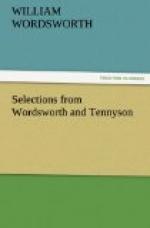283. And to the fields went forth Observe the inconsistency. The conversation took place in the evening. See l. 327.
284f. With A light heart. Michael’s growing misgivings are subtly represented in the following lines, and the renewal of his hopes.
367-368. These lines forcibly show how tenaciously Michael’s feelings were rooted in the soil of his home. Hence the extreme pathos of the situation.
388. Observe the dramatic force of this line.
393-396. What unconscious poetry there is in the old man’s words!
420. Scan this line.
445. Scan this line.
466. Matthew Arnold commenting on this line says; “The right sort of verse to choose from Wordsworth, if we are to seize his true and most characteristic form of expression, is a line like this from Michael: ‘And never lifted up a single stone.’ There is nothing subtle in it, no heightening, no study of poetic style strictly so called, at all; yet it is an expression of the highest and most truly expressive kind.”
467f. Note the noble simplicity and pathos of these closing lines. There is a reserved force of pent-up pathos here, which without effort reaches the height of dramatic effectiveness.
TO THE DAISY
Bright Flower! whose home is everywhere,
Bold in maternal Nature’s care,
And all the long year through the heir
Of joy and sorrow,
Methinks that there abides in thee
5
Some concord with humanity,
Given to no other flower I see
The forest thorough!
Is it that Man is soon deprest?
A thoughtless Thing! who, once unblest,
10
Does little on his memory rest,
Or on his reason,
And Thou would’st teach him how
to find
A shelter under every wind,
A hope for times that are unkind,
15
And every season?
Thou wander’st the wide world about,
Uncheck’d by pride or scrupulous
doubt,
With friends to greet thee, or without,
Yet pleased and wilting;
20
Meek, yielding to the occasion’s
call,
And all things suffering from all,
Thy function apostolical
In peace fulfilling.
8. Thorough. This is by derivation the correct form of the modern word “through.” A.S. thurh, M.E. thuruh. The use of “thorough” is now purely adjectival, except in archaic or poetic speech.
24. APOSTOLICAL. The stanza in which this word occurs was omitted in 1827 and 1832, because the expression was censured as almost profane. Wordsworth in his dictated note to Miss Fenwick has the following: “The word [apostolical] is adopted with reference to its derivation, implying something sent out on a mission; and assuredly this little flower, especially when the subject of verse, may be regarded, in its humble degree, as administering both to moral and spiritual purposes.”




